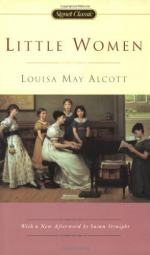“A friend of mine desired me to offer—a story—just as an experiment—would like your opinion—be glad to write more if this suits.”
While she blushed and blundered, Mr. Dashwood had taken the manuscript, and was turning over the leaves with a pair of rather dirty fingers, and casting critical glances up and down the neat pages.
“Not a first attempt, I take it?” observing that the pages were numbered, covered only on one side, and not tied up with a ribbon—sure sign of a novice.
“No, sir. She has had some experience, and got a prize for a tale in the Blarneystone Banner.”
“Oh, did she?” and Mr. Dashwood gave Jo a quick look, which seemed to take note of everything she had on, from the bow in her bonnet to the buttons on her boots. “Well, you can leave it, if you like. We’ve more of this sort of thing on hand than we know what to do with at present, but I’ll run my eye over it, and give you an answer next week.”
Now, Jo did not like to leave it, for Mr. Dashwood didn’t suit her at all, but, under the circumstances, there was nothing for her to do but bow and walk away, looking particularly tall and dignified, as she was apt to do when nettled or abashed. Just then she was both, for it was perfectly evident from the knowing glances exchanged among the gentlemen that her little fiction of ‘my friend’ was considered a good joke, and a laugh, produced by some inaudible remark of the editor, as he closed the door, completed her discomfiture. Half resolving never to return, she went home, and worked off her irritation by stitching pinafores vigorously, and in an hour or two was cool enough to laugh over the scene and long for next week.
When she went again, Mr. Dashwood was alone, whereat she rejoiced. Mr. Dashwood was much wider awake than before, which was agreeable, and Mr. Dashwood was not too deeply absorbed in a cigar to remember his manners, so the second interview was much more comfortable than the first.
“We’ll take this (editors never say I), if you don’t object to a few alterations. It’s too long, but omitting the passages I’ve marked will make it just the right length,” he said, in a businesslike tone.
Jo hardly knew her own MS. again, so crumpled and underscored were its pages and paragraphs, but feeling as a tender parent might on being asked to cut off her baby’s legs in order that it might fit into a new cradle, she looked at the marked passages and was surprised to find that all the moral reflections—which she had carefully put in as ballast for much romance—had been stricken out.
“But, Sir, I thought every story should have some sort of a moral, so I took care to have a few of my sinners repent.”
Mr. Dashwoods’s editorial gravity relaxed into a smile, for Jo had forgotten her ‘friend’, and spoken as only an author could.
“People want to be amused, not preached at, you know. Morals don’t sell nowadays.” Which was not quite a correct statement, by the way.




